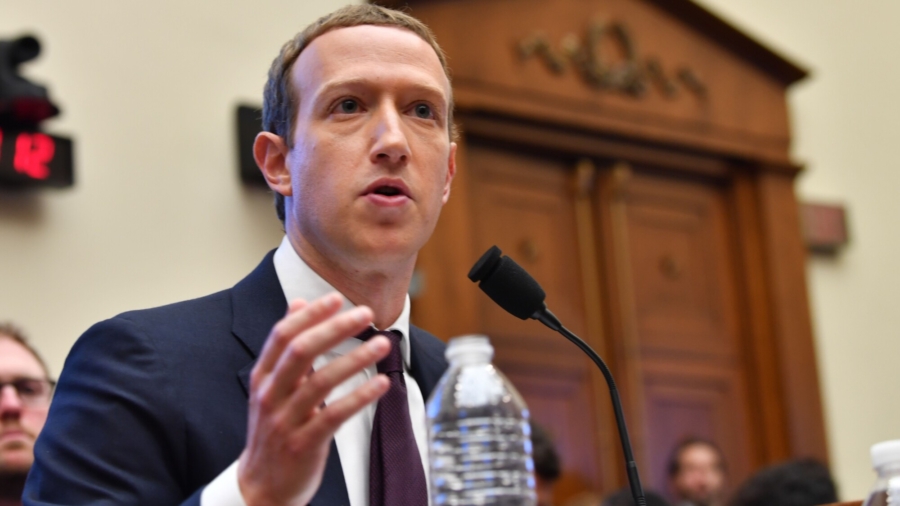The Republican-controlled House Judiciary Committee has set a Thursday vote on whether to initiate contempt of Congress charges against Facebook founder Mark Zuckerberg, citing his alleged failures to fully comply with the committee’s subpoena.
On Tuesday, the House Judiciary Committee announced a Thursday afternoon markup hearing, with one of the items on the agenda being to take up a report recommending that the panel cite Mr. Zuckerberg for contempt of Congress.
In February, House Judiciary Committee Chairman Jim Jordan (R-Ohio) issued a subpoena to Mr. Zuckerberg and leaders of other big tech companies asking about their involvement in government efforts to censor information online. The subpoena letter (pdf) to Mr. Zuckerberg specifically requested “communications between Meta and the Executive Branch, internal Meta communications discussing communications from the Executive Branch, and Meta communications with third parties that may have been working with the Executive Branch,” among other details about the company’s operations. The February subpoenas set a March 23 deadline for Meta and the other big tech platforms to provide the requested documents.
Meta Inc. is the successor to Facebook, which Mr. Zuckerberg founded in 2004 as his original social media platform. Meta encompasses the original Facebook platform as well as Instagram and Threads—a new application intended to challenge Twitter.
Rather than fully complying with the Feb. 15 subpoena, a House Judiciary Committee report (pdf) holds that Mr. Zuckerberg and Meta “produced a limited number of external communications with the Executive Branch and accompanying documents, many of which contained redactions of key information.”
The report contends that Mr. Jordan reached back out on May 19, almost two months after the deadline, specifying the documents still missing from the document production. What’s more, the House Judiciary Committee reported that specific Meta employees have confirmed the existence of the documents the committee has requested that Meta still has yet to turn over.
“As of July 19, 2023, the Committee has conducted transcribed interviews of nine current and former Meta employees. Several of those interviews corroborated the existence of these internal communications, as the witnesses confirmed that they communicated in writing with other Meta employees about the company’s interactions with the Executive Branch,” the House Judiciary Committee report states.
NTD News has reached out to Meta for comment on this document production issue. The social media company did not respond by the time this article was published.
Facebook and Government Censorship
The House Judiciary Committee is seeking records of communication between Meta and federal government offices because it contends that Meta worked at the behest of government actors to suppress certain social media content.
“At the government’s behest, Meta has removed specific posts and accounts, demoted certain types of content, and changed its policies in order to accommodate the government’s censorship demands,” the Judiciary Committee report states. “This has been particularly true when it comes to censorship of content related to COVID-19 and the COVID vaccines, as well as content related to elections and election integrity. Those who have questioned the safety or efficacy of lockdowns, masks, and vaccines have often found themselves suspended from the platform or had posts removed from Meta’s platforms.”
Summarizing transcribed interviews from Meta employees Brian Rice and Carrie Adams, the Judiciary Committee report states the two communicated that White House officials criticized Meta’s content moderation practices. Ms. Adams reportedly told the Judiciary Committee that White House officials “communicated that they would like to see more removal.”
“Presently available information demonstrates that the White House’s strongarming tactics succeeded,” the Judiciary Committee report continued. “For example, following the contentious meetings depicted by Rice and Adams, Facebook (a Meta subsidiary), noted in an email that in response to White House demands, the platform was censoring, removing, and reducing the virality of content discouraging vaccines even if such content did not ‘contain actionable misinformation.'”
The House report also noted the recent developments in the case of Missouri v. Biden, in which attorney generals for Missouri and Louisiana have argued that government officials had pressured private companies to censor certain speech because they knew the government could not do so.
On July 4, Judge Terry A. Doughty of the U.S. District Court for the Western District of Louisiana issued an injunction blocking nearly all federal government offices from communicating with big tech companies about their content moderation practices.
On July 14, the Biden administration won an appeal from a three-judge panel on the 5th Circuit Court of Appeals, staying the lower court’s preliminary injunction while the lawsuit proceeds. The two-page appeals court decision did not specify the reasoning for staying the lower court’s injunction. The three judges on the panel were Circuit Judge Carl E. Stewart, an appointee of President Bill Clinton; Circuit Judge James Earl Graves Jr., an appointee of President Barack Obama; and Circuit Judge Andrew Stephen Oldham, an appointee of President Donald Trump.

